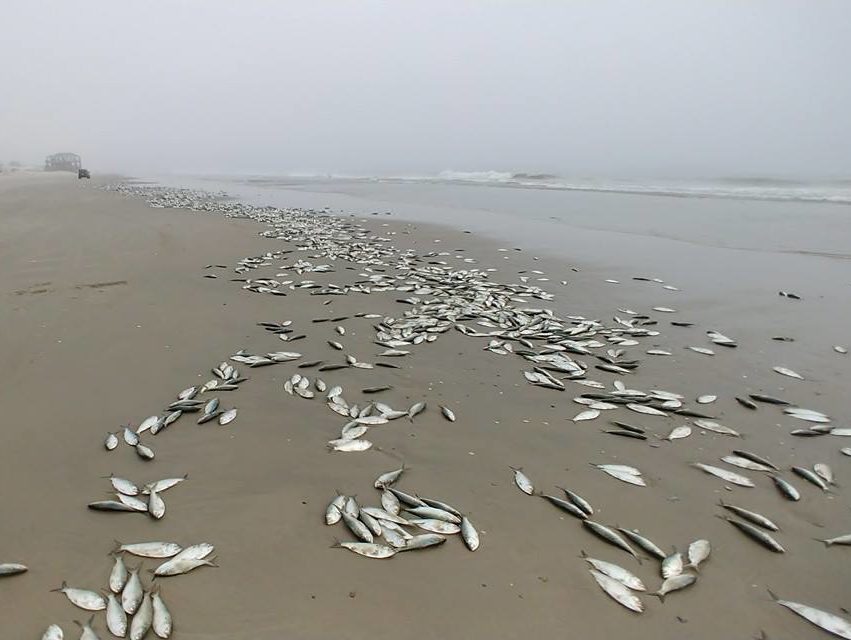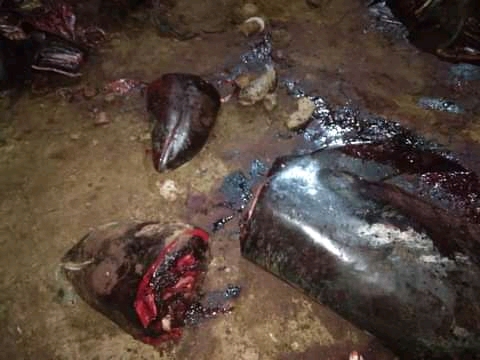The Environmental Protection Agency (EPA) on Sunday, April 4, 2021 counted more than 60 dolphins who were washed ashore dead along the coast of Axim-Bewire in the Nzema East Municipality of the Western Region of Ghana.
All the dolphins have however gone missing from the shore, as they are said to attract very high price in the market, with local fishermen accused of taken them to be processed for the market.
An eyewitness, told ghenvironment.org that, the residents of the community cashed in on the incident by selling off pieces of the dolphins to fishmongers while others were seen packing them into a truck.
The Marine Police Unit of the Ghana Police Service and personnel of the Fisheries Commission have since been dispatched to the scene to help contain the situation and retrieve them from those processing it if possible.
According to the EPA, the sea mammals did not wash shore alive but dead and it is important members of the public are prevented from having close contacts with them since it is not clear what caused them to wash ashore. Samples it said, have since been taken for laboratory analysis.
This year’s easter festivity seems to be a bad one for the fishing industry in Ghana as large numbers of different species of fish were also washed ashore along Osu in the Greater Accra Region and Keta in the Volta Region in the last two days.

The dead fishes washed ashore in Osu, Accra
Some of the large species of fish spotted in Osu in Accra were washed ashore on Friday, while, in Keta in the Volta Region, hundreds of dead tuna were also washed ashore on Sunday.
Environmental officers in these areas are also having a hectic time preventing members of the public from consuming the fish as it is being rumoured that, some of the dead fishes had already find their way into the Ghanaian market.
It is however suspected that, a chemical discharge into the sea might have caused the death of the dolphins and fishes, though at a different location of the country’s coastal areas.
The inside of the dead fish looks like a glue
The Korle Klottey Municipal Assembly has cautioned the general public against consuming fishes that were washed up unto the shores of some beaches in Accra.
According to the Municipal Chief Executive, Nii Adjei Tawiah, they initially thought the fish was likely from a big fish trawler offloading unto the sea, and were unbothered until they noticed something different about the fish.

Some of the butchered dolphins
“By mid-morning, the colour of some of the fishes started to change. We have also noticed that even when you cut them, the insides look like glue. So, we suspect there is something wrong,” he said.
Fisheries Commission begins probe
The Fisheries Commission says it has begun investigations into the incident of dead fish at the Osu Castle Beach in Accra.
According to the Commission, initial observation shows no wound or lesions on the bodies of the fish.
“Information got to Fisheries Commission yesterday, April 3, 2021, in the evening, about fish mortalities sighted at the Osu Castle Beach. A team from the Fish Health Unit and the Fisheries Scientific Survey Division of the Fisheries Commission was dispatched to the area. Upon arrival at the beach the team noticed that there were dead small pelagic and demersal fishes at the shore.
“Initial observation of the fishes showed no wound /lesions on their bodies. It is to be noted that after two to three days of death of an animal pathological signs change. Samples of the fish were collected on ice to be examined critically in the laboratory,” the Commission said in a statement Sunday.
The statement added: “Sea water samples have also been collected at the beach in the Korle Klottey District in the Greater Accra Region. Examinations will be carried out on the fish gills and other histological examinations will equally be conducted to ascertain any pathological cause. The sea water samples collected will be analysed for physical, chemical and other biological parameters. The colour of the sea and temperature are normal. We assure everyone that we are working hard to ascertain the actual cause of mortality of the fish”.
 The dead fishes washed ashore in Osu, Accra
The dead fishes washed ashore in Osu, Accra
 Some of the butchered dolphins
Some of the butchered dolphins


 The dolphins washed ashore
The dolphins washed ashore
